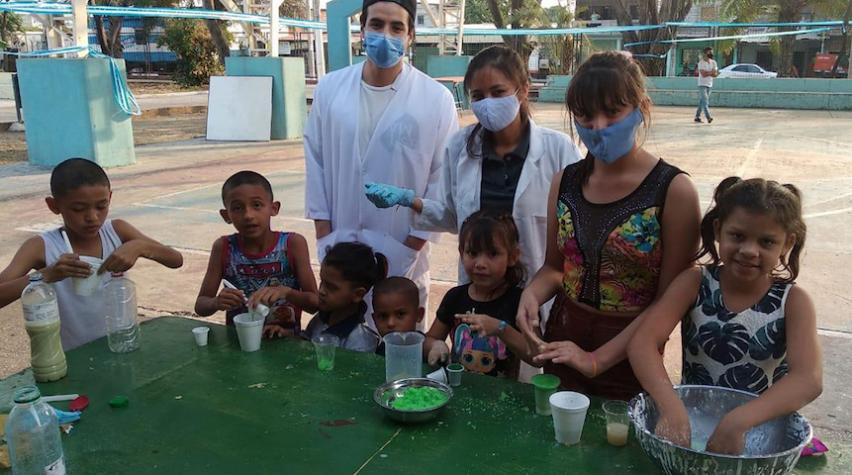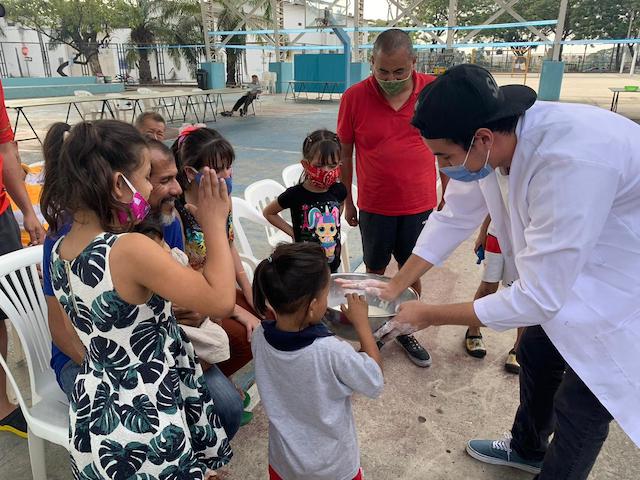
ESPOL Student Chapter members demonstrating how to make Ooblek, a great example of non-Newtonian fluids that is always a hit with young audiences.
At the 2020 K-12 STEM Outreach Competition, Ecuador’s Escuela Superior Politécnica del Litoral won the student competition and the best in 3rd to 5th grade category with its K-12 activity “Racing boats: The Science of Surfactants.” Fabiola Gutierrez, Katherine Zambrano, and María José Peñarrieta, chemical engineering students at ESPOL, shared their story with us.
About the students
Fabiola Gutierrez directed the ESPOL AIChE Chapter’s K–12 activities. She balances her studies with extracurricular activities that provide life skills. “Faby” has also been an academic and research assistant. Her research topics have varied from synthesis of organometallic complexes, tools for management of drinking water in rural communities, to simulation of a fermentation bioreactor, which is her current project. In the future, she would like to pursue a master’s degree related to water treatment or industrial chemistry.
Katherine Zambrano was the president of the ESPOL chapter in 2020. She enjoys extracurricular activities that help develop professional and personal skills. She also enjoys working in a team, while making a positive impact on the university and society. She wants to pursue environmental engineering in order to help implement more environmental and process safety projects in Ecuador. She plans to publish research on activated carbon derived from rice husks.
María José Peñarrieta (or “Majo”) was the Vice President of the K-12 program in 2020. She is a very dedicated student who works to make things better. Majo told us that she is sometimes insecure because she feels that she might not achieve her goals. She said that she manages everything with the support of her family and friends. In her free time, she loves listening to music, from salsa to hip-hop. She also likes to play basketball, although she humbly says she is not good at it. She wants to pursue a master’s degree with a focus on food. Her plan is to work hard for three years and to save enough to pay for her master’s degree.
As a new AIChE student chapter, the ESPOL students were not fully aware of all the activities that AIChE and the Annual Student Conference had to offer. However, membership and participation in the chapter soon grew, and the leaders became interested in AIChE’s Executive Student Committee, where they learned how to implement a local K-12 outreach program. One of the reasons for implementing the program was to help underprivileged children and schools that were interested in STEM. The ESPOL students shared their knowledge with children in a fun and creative way. Faby and Majo did an excellent job as directors; they mentor current directors.

Students from ESPOL performing science demonstrations for local schoolchildren.
STEM outreach
Explaining science to children has helped the ESPOL group improve their own understanding of engineering concepts. They also said that by teaching science and chemistry to children from an early age through simple experiments, you encourage them to become future chemical engineers.
Some of the chapter’s favorite activities were its summer workshop and Christmas show. The pandemic brought many challenges, and they missed the opportunity to interact face-to-face with the kids. It was particularly complicated to reach out to schools and collaborate with them. Nevertheless, ESPOL’s summer workshop was a great opportunity to interact with young students, via video.The ESPOL team saw the excited faces of kids while they did experiments.
The team mentioned a problem common to all of us who use virtual platforms: sending people to breakout rooms and returning them to the main room. Majo's advice is to check the resources of any application in advance, and to not despair in situations where technology goes wrong. It happens.
Impact of giving back
The students from ESPOL agreed that K-12 outreach activities have impacted their lives. They see it as an opportunity to be better planners, problem solvers, organizers, and sources of trust to each other. It also taught them how to work with children and keep them engaged.
The preparation of the team’s winning module “Racing boats” required creativity, video editing, preparing careful explanations, and engaging children in the topics. Last but not least, the role of communication has been vital in the program, not only among the team members but also with the schools that open the doors to work with them.
They also say that maintaining a K-12 program demands time. It is all about organization and setting short- and long-term goals. It is also important to work with a motivated group. With dedication and effort, they can balance their classes and outreach activities.
Words of wisdom
ESPOL’s words of wisdom for our readers are to remember that the small steps you take to do science move you closer to becoming a successful researcher or engineer. They would also like to invite other college students to be more involved in K-12 STEM activities.
If you would like to know more about the ESPOL Student Chapter’s activities, you can find them on their YouTube channel or on tiktok.
Learn more about the 2021 AIChE K-12 STEM Outreach Competition.

